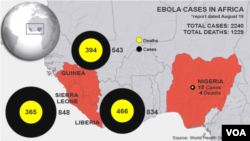Health officials in Juba have stepped up efforts to ensure the deadly Ebola virus does not spread to South Sudan.
Armed with thermometers and notepads, a team of health officials has set up shop in tents that have been pitched just meters away from where planes land at Juba’s busy international airport.
Whenever a traveler disembarks, "We give him this form to fill in with his name, nationality, airport of departure," Frederick Ladu, a public health official from the Central Equatoria Ministry of Health, told South Sudan in Focus.
Then, the officials use a non-contact, infrared thermometer to check the temperature of arriving passengers. If a passenger is found to have a fever, he or she will be held by the health officials. So far, no one entering South Sudan has been quarantined because they are suspected of having Ebola.
Ladu is one of 20 South Sudanese officials trained by the World Health Organization (WHO) to screen for Ebola at the airport.
The officials gather information including which countries the incoming passengers have visited in the last 21 days. That information is needed because the Ebola outbreak has impacted the West African countries of Guinea, Liberia and Sierra Leone and, the WHO says, a small number of people in Nigeria.
How effective are airport screenings?
The authorities in Liberia, Sierra Leone and Guinea are already checking departing passengers for signs of fever or illness.
But WHO medical officer Abdinasir Abubakar noted that screening someone for fever at the airport is not a 100 percent sure way of detecting Ebola.
"A patient may contract Ebola yesterday and then they fly today to Juba, and when they come to the airport, they may not show any symptoms," he said.
"But after three weeks, they may show symptoms," he added.
But airport screenings are important, Abubakar said. International travel can help to spread ebola and countries need to be prepared, he said.
“We have seen the trend of how the outbreak has spread from Guinea to Sierra Leone, to Liberia and what was interesting is Nigeria, and how only one patient has travelled to Nigeria and he has infected a number of people," Abubakar said.
South Sudan sets up task force
Ebola has a fatality rate of up to 90 percent. The virus is transmitted by direct contact with the blood, body fluids and tissues of infected animals or people.
Those at greatest risk of infection are health workers, family members and others in close contact with sick people and deceased patients.
South Sudan has set up an ebola task force, led by Vice President James Wani Igga, to try to keep the country Ebola-free. The Ministry of Health has prepared isolation wards at both Juba Teaching Hospital and at one of the U.N. Mission in South Sudan (UNMISS) camps in the capital, in case the disease manages to slip into the country.




